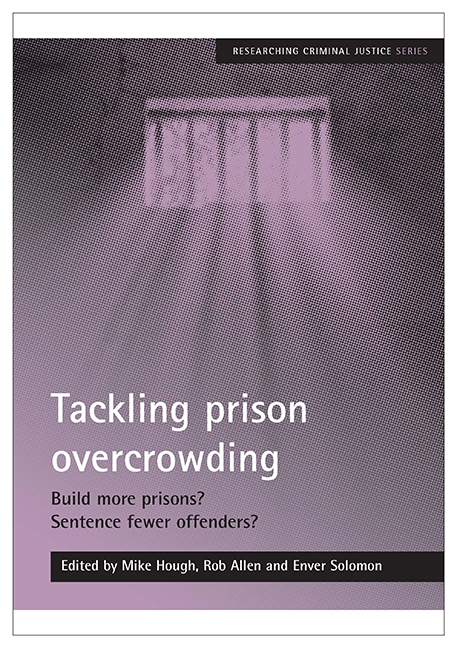Book contents
- Frontmatter
- Contents
- List of figures and tables
- Acknowledgements
- Foreword
- Notes on contributors
- 1 Introduction
- 2 The prisoners’ dilemma in England and Wales
- 3 Building on sand: why expanding the prison estate is not the way to ‘secure the future’
- 4 Towards more consistent and predictable sentencing in England and Wales
- 5 ‘Titan’ prisons: do size, efficiency and legitimacy matter?
- 6 Private punishment? An examination of the expansion, development and employment relations of private prisons
- 7 Reducing the use of custody as a sanction: a review of recent international experiences
- 8 Where now?
- 9 Endnote: latest developments in penal policy
5 - ‘Titan’ prisons: do size, efficiency and legitimacy matter?
Published online by Cambridge University Press: 25 March 2023
- Frontmatter
- Contents
- List of figures and tables
- Acknowledgements
- Foreword
- Notes on contributors
- 1 Introduction
- 2 The prisoners’ dilemma in England and Wales
- 3 Building on sand: why expanding the prison estate is not the way to ‘secure the future’
- 4 Towards more consistent and predictable sentencing in England and Wales
- 5 ‘Titan’ prisons: do size, efficiency and legitimacy matter?
- 6 Private punishment? An examination of the expansion, development and employment relations of private prisons
- 7 Reducing the use of custody as a sanction: a review of recent international experiences
- 8 Where now?
- 9 Endnote: latest developments in penal policy
Summary
Effective management of the prison system is critical to the integrity of the criminal justice system as a whole. (Carter, 2007, p 3)
When you are working in a prison, you can see how easily it could all slip away from you … (Senior manager, personal communication, 2008)
These prisons will not be prisoner warehouses. (Prison Service, 2007, p 1)
The Review's vision is for a prison system which encourages innovation, efficiency and competition but with a clear line of accountability from the prisons minister to prison officer. The structure and focus of the prison system should, over time, be reconfigured to increase the focus on both service delivery and offender management. (Carter, 2007, p 3)
The Carter Report 2007
Lord Carter's Report was commissioned to explore ways of saving money, and building new capacity. Since size is a major determinant of cost, considerable thought has been devoted to the question of what the ‘optimal’ size of a new prison might be. The report recommends the building of two to three ‘larger, state of the art’ or ‘Titan’ prisons accommodating around 2,500 prisoners each. The term is objectionable, referring to giant stature and physical strength or power (The New Shorter Oxford Dictionary, 1994) so I wonder whether we should refer to them more descriptively and neutrally, as the large, cluster concept. These prisons should be ‘planned and developed now so that from 2012 there can be approximately 5,000 new places that will allow for a programme of closures of old, inefficient, and ineffective prisons offering better value for money and much improved chances of reducing re-offending and crime’ (Carter, 2007, p 1). Carter's Report, we should note, is given the sub-title, ‘Proposals for the efficient and sustainable use of custody in England and Wales’, not ‘Proposals for the legitimate use of custody in England and Wales’. His task was ‘to consider options for improving the balance between the supply of prison places and demand for them’ (Carter, 2007, p 1). The Titan or large, multifunctional prison concept is all about cost effectiveness. It might be interesting to think through how the report might have looked different had the concept of legitimacy been part of the agenda.
- Type
- Chapter
- Information
- Tackling Prison OvercrowdingBuild More Prisons? Sentence Fewer Offenders?, pp. 63 - 80Publisher: Bristol University PressPrint publication year: 2008



